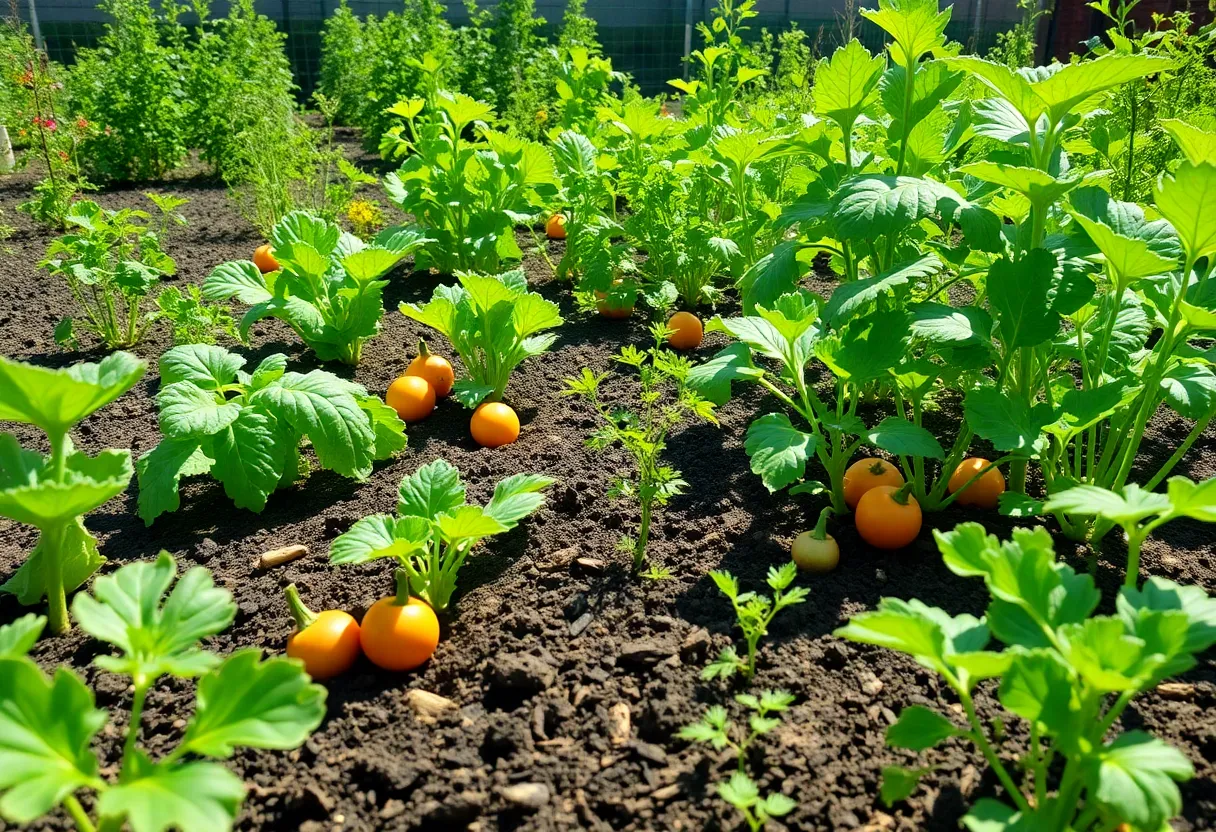How to Grow a Thriving Vegetable Garden in Philadelphia’s Unique Climate
Understanding Philadelphia’s Climate and Hardiness Zone
Philadelphia is classified within USDA Hardiness Zone 7a. This classification indicates that average minimum winter temperatures range from 0°F to 5°F (-17.8°C to -15°C). Recognizing this zone is critical for selecting suitable vegetable varieties and planning your planting schedule.
The climate entails cold winters and moderate summers, providing a growing season that generally spans from early April through mid-November. Such conditions influence seed selection, transplant timing, and crop management strategies for optimal yield.
Optimal Planting Times for Philadelphia
Precisely timing your planting activities is vital. The average last frost date typically falls around April 20th, though it varies slightly across different neighborhoods and outlying areas. Planning sowing and transplanting schedules around this date minimizes the risk of frost damage.
Implementing zone-appropriate planting windows ensures seedlings establish well and mature before the first hard frost in fall. For example, early crops like peas and leafy greens should be sown in early spring, while warmer-season crops require later planting or starting indoors.
Choosing the Right Vegetables
Philadelphian soil and climate are conducive to a variety of vegetables. Selecting suitable crops improves yield and reduces failure rates. The list below breaks down vegetables by seasonal tolerance.
Cool-Season Vegetables
- Peas
- Fava Beans
- Onions
- Leeks
- Garlic
- Collard Greens
- Kale
- Mustard Greens
- Turnips
- White Potatoes
- Cabbage
- Lettuce
- Radishes
- Beets
- Carrots
- Shallots
- Spinach
- Bok Choy
- Parsley
- Swiss Chard
Warm-Season Vegetables
- Watermelons
- Winter Squash
- Melons
- Summer Squash
- Cucumbers
- Pumpkins
- Sweet Potatoes
- Okra
- Chinese Cabbage
- Sweet Corn
- Peanuts
- Lima Beans
- Beans (Bush, Pole, Shell, Dried)
- Black-Eyed Peas
- Eggplant
- Peppers
- Tomatoes
- Basil
- Gandules
Planting Schedule and Techniques
A structured planting timetable maximizes vegetable production. Here is a concise overview:
Early Spring (Mid-March to Mid-April)
- Direct sow: Peas, fava beans, onions, leeks, garlic, collard greens, kale, mustard greens, turnips, white potatoes, cabbage.
- Transplant seedlings: Lettuce, radishes, beets, carrots, shallots, spinach, bok choy, parsley.
Late March to Mid-May
- Direct sow: Swiss chard, additional beets.
- Transplant: Broccoli, collards, leeks, onions.
Early May to Mid-June
- Direct sow: Watermelons, winter squash, melons, summer squash, cucumbers, pumpkins, sweet potatoes.
- Transplant: Okra, Chinese cabbage, sweet corn, lima beans, peanuts.
Mid-May to Mid-July
- Direct sow: Beans (bush, pole, dry).
- Transplant: Eggplant, peppers, tomatoes, basil, gandules.
Cool Fall (Early June to Mid-June)
- Direct sow: Collards, cabbage family crops, celery.
Mid-July to August
- Direct sow: Carrots, beets, Swiss chard.
- Transplant: Broccoli and other cabbage family crops.
Late July to September
- Direct sow: Radishes, spinach.
- Transplant: Salad greens, other greens, peas.
Early Fall (September to October)
- Plant: Garlic (for harvest next spring).
- Cover crops: Hairy vetch, rye grass, oats.
For consistent harvests, plan to sow new seed batches every two weeks to ensure continuous yield and avoid gaps.
Soil Preparation and Maintenance
Soil health underpins productive gardening. In Philadelphia, soil may need amendments due to varying composition and drainage. Incorporate organic matter such as compost regularly to enhance fertility and soil structure.
Regular soil testing provides data on pH and nutrient levels. Adjustments, like adding lime or sulfur, help maintain optimal conditions for specific crops.
Watering Practices
Consistent watering is essential. Use early morning watering sessions to provide adequate moisture while minimizing disease risk. An efficient drip irrigation system conserves water and delivers consistent moisture directly to roots, promoting healthy growth.
Pest and Disease Management
Implement integrated pest management strategies to control pests and diseases effectively. Regularly inspect plants for early signs of trouble—discolored leaves, spots, or holes. Encourage beneficial insects like ladybugs or lacewings that naturally prey on pests.
Use organic pesticides cautiously and only as necessary, following the manufacturer’s instructions precisely to avoid harming beneficial insects or the environment.
Extending the Growing Season
Extend your garden’s productivity with season extenders such as row covers, hoop houses, or cold frames. These structures safeguard plants against early frosts and improve microclimate conditions. They enable earlier planting and delayed harvests, maximizing yield potential.
Conclusion
Creating a thriving vegetable garden in Philadelphia hinges on understanding the local climate, sticking to appropriate planting schedules, and practicing diligent soil, water, and pest management. Employing season extenders and selecting inherently adaptable vegetables will bolster success. With careful planning and consistent effort, gardeners can enjoy bountiful harvests across multiple seasons, despite the city’s climatic challenges.
Frequently Asked Questions
What is the best time to start planting vegetables in Philadelphia?
The optimal window is after the last frost date around April 20th. Start with cool-season crops in early spring and warm-season crops after the soil warms in late spring or early summer.
Which vegetables grow best in Philadelphia’s climate?
Crops like kale, lettuce, broccoli, peas, carrots, potatoes, and herbs generally thrive. Warm-weather crops such as tomatoes, peppers, eggplant, and melons require careful timing but can be successful with season extenders.
How can I extend the growing season in Philadelphia?
By deploying row covers, cold frames, or hoop houses, gardeners can protect crops from early frosts, enabling earlier planting in spring and prolonged harvesting into fall.
What soil amendments are recommended?
Adding compost and organic matter improves fertility and drainage. Conduct soil testing periodically to adjust pH and nutrient levels appropriately.
Are there pests specific to Philadelphia I should watch for?
Common pests include aphids, cabbage worms, and beetles. Regular inspections and encouraging natural predators are key to pest management.
FAQ Schema (JSON-LD)
Key Features Summary
| Aspect | Details |
|---|---|
| Hardiness Zone | 7a |
| Growing Season | Early April to mid-November |
| Frost Date | Approximately April 20th |
| Optimal Soil | Rich in organic matter, pH 6.0–7.0 |
| Watering | Consistent, early morning, drip irrigation recommended |
| Pest Management | Integrated Pest Management, beneficial insects, organic pesticides |
| Season Extenders | Cold frames, row covers, hoop houses |
Author: STAFF HERE PHILADELPHIA WRITER
The PHILADELPHIA STAFF WRITER represents the experienced team at HEREPhiladelphia.com, your go-to source for actionable local news and information in Philadelphia, Philadelphia County, and beyond. Specializing in "news you can use," we cover essential topics like product reviews for personal and business needs, local business directories, politics, real estate trends, neighborhood insights, and state news affecting the area—with deep expertise drawn from years of dedicated reporting and strong community input, including local press releases and business updates. We deliver top reporting on high-value events such as Mummers Parade, Philadelphia Flower Show, and Thanksgiving Day Parade. Our coverage extends to key organizations like the Greater Philadelphia Chamber of Commerce and United Way of Greater Philadelphia, plus leading businesses in telecommunications, food services, and healthcare that power the local economy such as Comcast, Aramark, and Children's Hospital of Philadelphia. As part of the broader HERE network, we provide comprehensive, credible insights into Pennsylvania's dynamic landscape.





